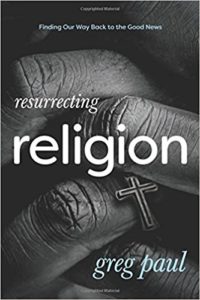A Review of Greg Paul’s new book, Resurrecting Religion (NavPress).

Impatient with theological abstraction.
Radically committed to justice.
Holds a healthy suspicion of the rich.
Rooted in a deep, deep piety.
Embraces subversive joy in the midst of tragedy.
Circumspect and wise regarding language.
Profoundly committed to prayer.
Intimately related to Jesus.
Who might I be talking about?
I hope that you have lots of people
that are immediately coming to mind.
I hope that maybe, with humility,
and perhaps sheepishly,
you might even think that this is you.
Or perhaps the you that you wish you were.
But I’m actually thinking of two people:
James, the brother of Jesus,
and Greg Paul, another brother of Jesus.
And those of us who know Greg Paul
do not find it at all surprising that he is so drawn
to James and the letter that he wrote to Jewish Christians
dispersed throughout the Roman empire.
You see, Greg has a striking resemblance to James.
And like James before him,
Greg has taken up the task of
“resurrecting religion.”
We all know the bad rap that religion
has got in recent years,
and not just by the atheists,
but from within as well.
Who can forget Bruxy Cavey’s The End of Religion?
I mean, Bruxy has pretty much revitalized
a little and declining denomination
on the basis of that book and the ministry
that emerged at The Meeting House.
[I suspect that Bruxy himself can taste the irony.]
And we all know that mainline churches are dying,
with the rest of Christendom.
No wonder that so many folks talk about being
“spiritual but not religious.”
And you might figure that a guy so deeply shaped
by an alternative community like Sanctuary in Toronto
just might be willing to get on board the
“dump religion” bandwagon.
Nope.
Not Greg Paul.
Like James before him,
Greg wants to resurrect religion,
give it a new body,
allow it to be what it is called to be,
coming to life again,
with all of its scars open to view.
And you can see where this is going, can’t you.
Here’s what James has to say about religion:
“Religion that God our Father accepts
as pure and faultless is this:
to look after orphans and widows in their distress
and to keep oneself from being polluted
by the world.”
If that is religion, Greg Paul is arguing,
then we need more of it, not less.
Like all of Greg Paul’s books,
Resurrecting Religion is rooted
in the Sanctuary community.
If the religion that is to be resurrected
is to have bones and flesh on it,
if it is be a living, dynamic,
acting, grieving, struggling
and rejoicing body
with orphans and widows,
the marginal and broken,
the poor and addicted,
the mentally ill and rejected
at its heart,
then we need to be able to see
this kind of religion in the flesh,
if we are to hold any hope
for such wider resurrection.
Masterful storyteller that he is,
Greg invites us into the lives
of folks who, in all of their faults,
embody the religion that James envisions.
Indeed, the book moves between
deep and rich engagement with
the Epistle of James,
and the epistles written in life
within the Sanctuary community.
What I so appreciate about this book
is that Greg’s sensitive, careful,
respectful and loving storytelling
is mirrored in his exposition of James.
And if you get close to James,
then you get close to Jesus.
The ancient tradition that the author
of the epistle is none other than
the younger brother of Jesus,
is born out in the reading of the epistle itself.
If James wasn’t actually present on that mountainside
when Jesus preached the sermon on the mount,
then he had probably heard this stuff from his big brother
at the dinner table over the years.
Just as the epistle of James reads
as something of an extended reflection
on the sermon on the mount,
especially the Beatitudes,
so also does Resurrecting Religion
move back and forth from the epistle
to the gospels,
with Sanctuary narratives grounding it all
in present experience.
The result is something of a manifesto.
And that seems to be something new for Greg Paul.
Greg has always spoken compellingly
and pastorally, with a deep prophetic edge.
His books have invited us into the Sanctuary
community not as a model to duplicate,
but as a path of discipleship to join.
But this book takes it all a step further.
This book is a call to the church to reformation.
This is a bold call to a radical embrace
of the religion of Jesus,
and will not hesitate to use,
and attempt to redeem and reclaim,
that word – religion.
Like all good biblical reflection,
this book is an act of imagination
for the liberation of our imaginations.
Let me give you one sample:
Imagine if the church in this world, and the individuals who make it up, actually looked and acted like Jesus. Instead of spending most of our time and resources on a razzle-dazzle Sunday morning service, together we’d heal the sick, feed the hungry, embrace the unwelcome, set prisoners free, restore the dignity of people who have been humiliated, flip the tables of oppressive economics, offer forgiveness instead of seeking vengeance, sacrifice rather than protect ourselves, and much, much more. We’d vote for governments that promised to do those things, instead of caving to the miserable, miserly, faith-starved inducement of tax reduction or other me-first policies. White police officers and young black men would embrace, and pray together. We’d send armies of servants instead of soldiers to less fortunate countries; we would overwhelm our enemies with love and self-sacrifice. We’d be content with having enough, and rather than continually seeking more, more, more, we’d share our excess with those who don’t have enough. We’d do all this as well as announcing the Good News of salvation for the individual soul ….
Well … yes.
Well … amen.
Here is a spirituality that breaks through
the tired old evangelical/liberal dichotomies.
Here is a spirituality that just might
open the Bible to you anew,
precisely because this is a spirituality
that knows what the Kingdom looks like,
and what resurrected religion is called to be.
It is, therefore, not surprising, that this is a spirituality that is:
Impatient with theological abstraction.
Radically committed to justice.
Holds a healthy suspicion of the rich.
Rooted in a deep, deep piety.
Embraces subversive joy in the midst of tragedy.
Circumspect and wise regarding language.
Profoundly committed to prayer.
Intimately related to Jesus.
That’s James.
That’s Greg Paul.
That’s Resurrecting Religion.
